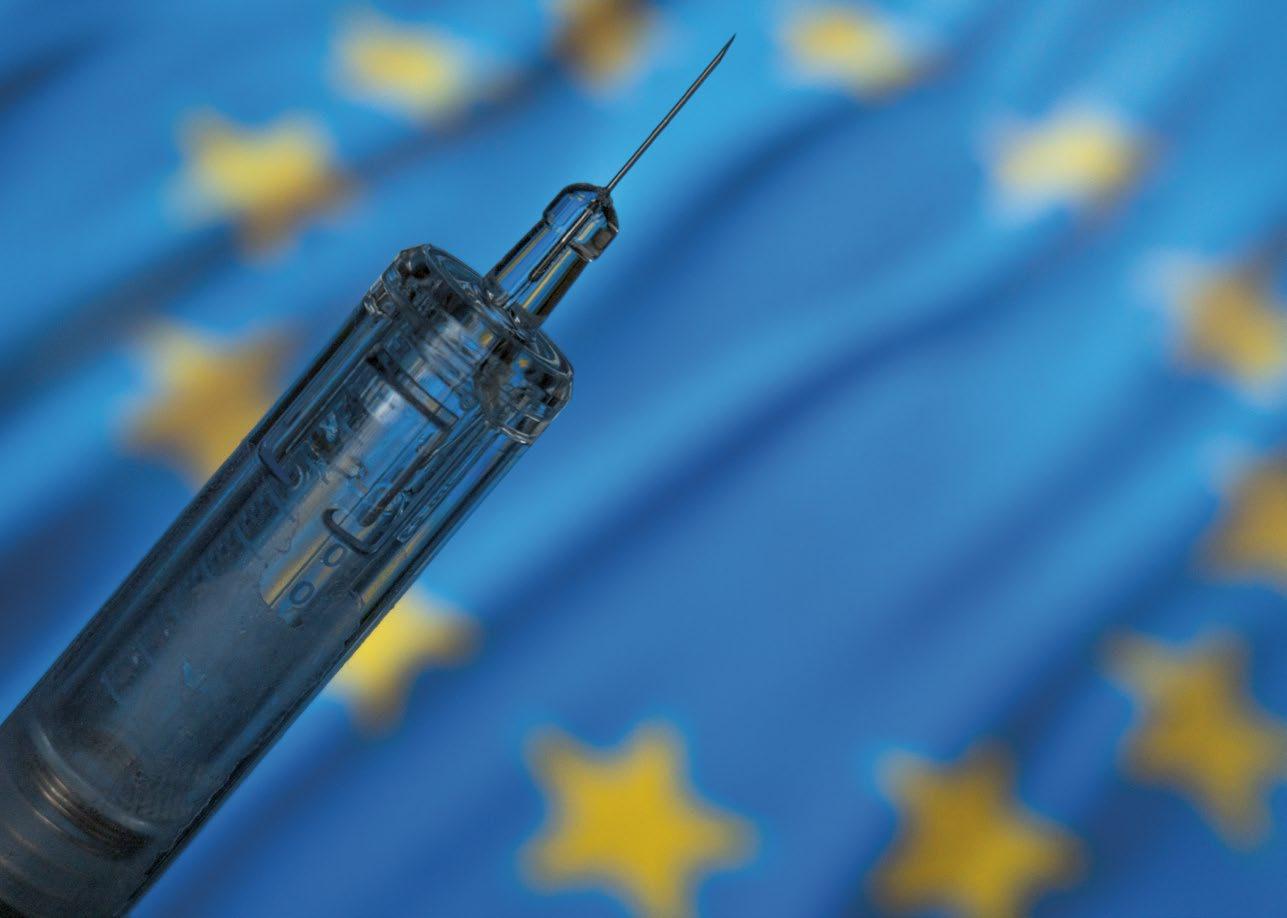
10 minute read
Meet the Policy Subcommittee’s ECS members
Whether you are just starting your career or enjoying retirement, SfAM’s Policy Committee needs your perspective and skills to ensure our work is robust and reflective of all SfAM’s membership. Hear from two early career members sharing their experiences of what it is like to participate in SfAM’s Policy Subcommittee (PSC), and the different opportunities it has provided them.
Jacob Hamilton
Advertisement
Member of the SfAM Policy Subcommittee
I applied to SfAM’s Policy Subcommittee (PSC) because the relationship between science and politics is something I’ve been interested in for quite some time. Although I had a fair amount of policy experience, both solo and with SfAM’s support, I had applied as much to express an interest in greater involvement with the Society than with any expectation of being awarded a position. Like many other early career scientists, I thought that governance of a learned society was the realm of elderly white professors in the end stages of their careers with a wealth of experience and contacts to draw upon. So, when I was offered a position on the PSC a year into my PhD I was quite surprised. Now, after a year of sitting on the Subcommittee, I see how much of a misconception this was.
The PSC is comprised of a diverse group of scientists, in a variety of career stages and specialisms, from a range of backgrounds. This range is a refreshing change in science and I have really enjoyed hearing everyone’s journey into microbiology. This diversity is key to the PSC’s effective response to the wide range of policy issues we tackle and our ability to consider the possible implications for various groups of people. It also makes for a welcoming environment where I feel empowered to speak up and voice my opinion. Moreover, I feel like I’m listened to, which is great because otherwise there wouldn’t be much point me being there!
As a member of the PSC, I’ve considered many significant policy challenges. One of the PSC’s responsibilities is to contribute to the Society’s responses to government consultations. Some consultations can be quite daunting, as they are often outside my area of research. During my time on the Subcommittee, we’ve worked on waste water treatment, antibiotic use in livestock and the ocean microbiome to name a few – all far beyond my own work on insect/microbe symbiosis.
PSC members also frequently work with the Policy Team to produce briefs for politicians and other stakeholders who themselves are new to the topic in question – so obviously there isn’t a neat summary available to us from the start! While I found this especially hard and felt out of my depth when I first joined the PSC, the need to pivot between topics I have little prior knowledge on has helped me to think more dynamically in the lab. This is especially useful when trying to balance three different experiments before going into a seminar.
Despite these challenges, I enjoy working with the PSC, and have volunteered do more with SfAM. Just recently, I was added to SfAM’s COVID-19 Task and Finish Group (TFG) on ‘Future Preparedness’, which is currently looking into vaccine hesitancy – a personal interest of mine and an opportunity to work on my public engagement skills. It’s also a great way to meet more people in the policy world and build up my contacts for when I finish my PhD. I’m looking to do more work with the policy team and the TFG – and maybe even getting to meet them in person again soon!

Lucas Walker
Policy Officer for the Early Career Scientists Committee
Working for the Policy Subcommittee (PSC) gave me some valuable insight into how societies such as SfAM work to translate the scientific expertise of their members into policy. As an ECS member, attending PSC meetings was an interesting experience. Having had no prior background in policy, I felt quite out of my depth at first, but feel I have learned a lot from these sessions. Topics of discussion included food safety, marine microbiomes and of course COVID-19. This impressed upon me the breadth of topics that microbiology research can contribute to.
One thing I had not fully appreciated until joining the PSC was SfAM’s commitment to diversity and inclusion, having previously only considered science policy through the lens of microbiology research topics (e.g. AMR, microbiomes, biofuels etc.). Meetings always have some time devoted to thinking about how to support the different needs of SfAM members – ECS members in particular. I also gained some incredibly valuable experience in writing up policy documents on vital issues including antimicrobial resistance and tackling the challenges facing our oceans. This involved identifying members who may have some insight into these topics and working with them to compile the key points we should be outlining to policymakers. This allowed me to delve into areas of microbiology research outside of my own, which I might otherwise not have considered.
As I am now in the final year of my PhD, it is important to know which career pathways are open to me in the future. Working with the PSC has given me a flavour of working in science policy and science communication, both of which are options I will strongly consider going forward!

I had not fully appreciated SfAM’s commitment to diversity and inclusion

The latest news, views and microbiological developments
CHROMagar for colourful microbial detection
In 1979 Dr. Alain Rambach introduced his chromogenic technology to the microbiology world. The introduction of this technology triggered a revolution in microbial diagnosis, highly improving and simplifying traditional culture techniques.
Today, CHROMagar supplies the widest range of chromogenic culture media available, covering applications in clinical bacteriology, industrial microbiology, quality control for food and beverage industries, water testing and environmental monitoring... among other fields. These media allow for a quicker and simpler detection of key clinical and food-borne pathogens.
Further information
Visit: www.bioconnections.net Tel: +44 (0)1782 516010 Email: welcome@bioconnections.co.uk
Save money and give used equipment a new lease of life
At Don Whitley Scientific (DWS) we have expanded our services to include the refurbishment and sale of second-hand DWS laboratory equipment such as anaerobic workstations, spiral platers and sample/media preparators.
Many laboratories are currently experiencing dramatic workload increases due to the pandemic – but unfortunately budgets are often not increasing at the same rate. DWS is providing a unique opportunity to acquire high quality, restored equipment that can still provide several years of reliable service without breaking the bank.
We also periodically rotate our demonstration equipment, giving you the opportunity to purchase newer, higher spec pieces of apparatus with an ex-demo discount.
Our service and apprentice engineers are thoroughly trained in the maintenance of all our legacy equipment, in addition to our current product range. With a choice of maintenance options, from extended warranties to fully comprehensive contracts, DWS enables microbiologists to protect their investments, minimise downtime and keep their labs running as smoothly as possible.
In addition to purchasing used equipment outright, monthly rental plans are also available. These can be tailored to suit your specific needs – whether short or long term. You can also part-exchange an older model and reduce the price of a new piece of capital equipment.
Further information
Visit: www.dwscientific.com Tel: +44 (0)1274 595728 Email: sales@dwscientific.co.uk
The company Genetic PCR Solutions™ develops an exclusive PCR kit for the new lineage B.1.1.7 emerging in the UK
The test will allow monitoring of the expansion of this new variant of the SARS-CoV-2 that causes COVID-19.
Monday, December 28, 2020. The Spanish company, branded Genetic PCR Solutions™ (GPS™), has developed the qPCR reagent kit UK-variant B.1.1.7 SARS-CoV-2 dtec-RT-qPCR, for the specific genetic detection of the new described lineage B.1.1.7 and published in the UK. This SARS-CoV-2 variant expanded rapidly in several British locations and has already jumped to other countries in Europe.
The GPS™ team has analyzed thousands of genomes of this new B.1.1.7 lineage, and other emerging new variants. First of all, they verified that these variants were also detected by the qPCR kit for COVID-19 developed by GPS™ in January 2020, thus once again validating its usefulness as a diagnostic tool in all existing variants. However, there was the need of providing a test that identifies only B.1.1.7 variant to be used as a useful tool for epidemiological surveillance. “Based on unique mutations, specific for this phylogenetic line, we have designed a set of qPCR reagents that only detect this new lineage,” says Dr Martínez-Murcia. The new qPCR kit can be performed simultaneously in the same qPCR run with the COVID-19 diagnostic test firstly launched
by GPS™, using the same sample and avoiding the complex and expensive method of sequencing to identify SARS-CoV-2 B.1.1.7.
This new kit has already been validated with synthetic RNA genomes and clinical samples following criteria of UNE/EN ISO 17025:2005 and is currently available.
Further information
Visit: www.geneticpcr.com Tel: +34 96 542 9901 Email: info@geneticpcr.com
Three Alicyclobacillus type strains isolated from fruit juices now available from NCIMB
Three type strains of the genus Alicyclobacillus have recently been added to the National Collection of Industrial, Food and Marine Bacteria. Strains of this genus are a cause of microbial spoilage in fruit juices. It has been reported that the heat tolerance of Alicyclobacillus strains means that they can survive the pasteurisation regimes typically used in fruit juice manufacture, and all three of the newly added strains are acid and heat tolerant, spore forming rods. They were isolated by scientists from Cornell Agritech, and deposited at NCIMB by Cornell University.
NCIMB 15264 Alicyclobacillus fructus was isolated from mixed fruit juice concentrate, NCIMB 15265 Alicyclobacillus sucus was isolated from apple juice, and NCIMB 15266 Alicyclobacillus mali was isolated from pear juice.
NCIMB Ltd. curates the National Collection of Industrial, Food and Marine Bacteria, as well as offering a range of microbiology, biological material storage and analytical services. Our culture collection is comprised of ACDP hazard group 1 and 2 microorganisms isolated from all kinds of environments. It includes not only bacteria, but also plasmids and bacteriophages.
Further information
Visit: www.ncimb.com Tel: +44 (0)1224 009333 Email: enquiries@ncimb.com
NCPV supporting pandemic research
In the last 20 years, three novel coronaviruses have emerged resulting in significant morbidity and mortality. While our recent experiences with SARS-CoV, MERS-CoV and SARS-CoV-2 paint the picture of coronaviruses as an extreme threat to human health, the four other coronaviruses known to infect humans typically result in a milder respiratory illness often referred to as ‘the common cold’.
Although significant research surrounding the ongoing pandemic is focussed on SARS-CoV-2, access to isolates of seasonal coronaviruses can assist in multiple areas including understanding tissue tropism, replication dynamics, pathogenesis and assessing specificity of rapid diagnostics and point-of-care tests.
NCPV have released three new accessions to assist the research community: OC43, NL63 and 229E. As these viruses are likely to be used in pandemic-response activities, NCPV are currently offering a 50% discount by using promocode CORONA50 until the end of March 2021.
Further information
Visit: www.phe-culturecollections.org.uk/NCPV Tel: +44 (0)1980 612512 Email: culturecollections.businessE@phe.gov.uk Twitter: @NCPV
A20 Anaerobic Workstation small but with big ideas!
The same precise control of atmospheric parameters as larger Whitley Anaerobic Workstations, but compact, economical and easy to use. Call today for a demonstration
Tel: 01274 595728 | www.dwscientific.com
European Academy of Microbiology is ensuring effective vaccines in the time of COVID-19

Even with a vaccine against COVID-19, there are a number of steps required to ensure it is effective. It will need to be produced in sufficient quantities, extensively distributed globally, and taken up by a high enough proportion of the general population. These are issues for governments as well as scientists to encourage.
Leading experts from the European Academy of Microbiology have produced a paper ‘Development of vaccines at the time of COVID-19’ discussing current issues surrounding the development and implementation of vaccines. By explaining the research and development processes and costs, as well as highlighting new technologies that are revolutionising the vaccine landscape, the paper provides advice and highlights key factors both policymakers and researchers need to consider in order to efficiently prepare and roll out vaccination programmes during pandemics.









